Lilly King, the Killer Instinct Competitor and the Goofball
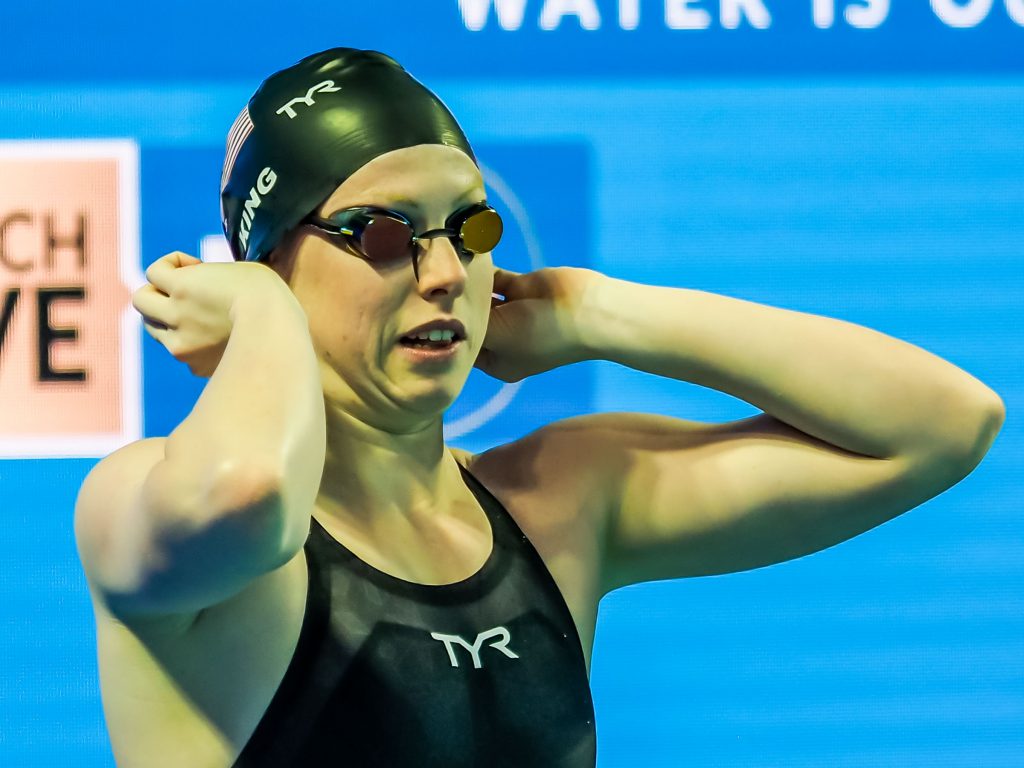
Lilly King, the Killer Instinct Competitor and the Goofball
(From April’s Swimming World Magazine)
Five years after her public introduction to the world at the Rio Olympics, little has changed about Lilly King. She will still speak her mind, she will still tell you how she really feels, and she’s still a winner, a dominant force in sprint breaststroke.
**********
Lilly King has put together a remarkable swimming career in the years since, and she could continue dominating for years to come, but she knows she may never escape the memory of the Rio Olympics—and specifically, the women’s 100 breast semifinals on Aug. 7, 2016, and the final the next day.
Almost five years later, King’s name is synonymous with that particular race.
King was 19 and competing in her first international meet, and she told the world that she didn’t think Russia’s Yulia Efimova, her chief competitor for the gold medal, should be competing at the Olympics because of her doping history. During the semifinals, Efimova raised her finger as she recorded the top time in the first semifinal, and as King watched in the ready room, cameras captured her waving her finger back at Efimova.
A rivalry instantly materialized.
“Especially now that it’s five years later, it’s insane to me. I think about how young I was. Who let me go to the Olympics?” King said. “I was blissfully ignorant the whole time. I was so new to it that I didn’t understand what was going on. I didn’t understand what I had done. I didn’t understand the scale of what I had said. I didn’t understand the scale that it would grow to.”
That night, King returned to the Olympic Village, thinking nothing of her words. That’s when she realized her story had exploded and she had gained 40,000 Instagram followers in the span of a couple hours.
“It was nuts,” King said. “It was a very early public introduction for me. ‘I’m going to create the biggest spectacle I can, on the largest scale. I’m going to make this the hardest race anyone could ever win, and I’m going to go out there and win.’”
Thankfully for King, everything worked out in the pool the following night. She won the final in 1:04.93, topping Efimova by more than a half-second and setting an Olympic record. The exuberant teenager splashed the water in celebration and barely acknowledged Efimova.
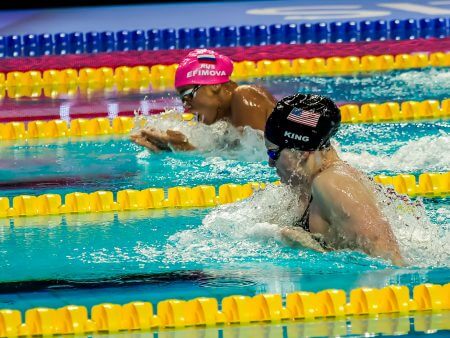
Lilly King racing against Russian rival Yulia Efimova in 2019 — Photo Courtesy: Peter H. Bick
In the aftermath, many accused King of poor sportsmanship because she publicly criticized Efimova. She was labeled a bully. Even years later, King will have none of it. She sees a double standard in public expectations for male professional athletes versus females. King believes that if a prominent male athlete were to take a stand on an issue he felt passionate about, he would have been celebrated for his confidence and bravery, rather than chastised for being cocky and obnoxious.
King has seen improvement in recent years in the way female athletes are viewed when they speak their minds on important issues. She thinks the U.S. women’s soccer team paved the way for that change when they won the 2019 FIFA World Cup while in a dispute with their own national federation.
“That was a big, pivotal moment for women in sports, in my opinion, because you see this whole group of super strong females, and they’re speaking their mind, and they’re fighting for equal pay,” King said.
Others, including Olympic gymnast Simone Biles and Olympic gold medalist swimmer Simone Manuel, have become more outspoken about issues they are passionate about, notably racial justice, and King sees that as positive progress, that strong female athletes are using their voices to impact change.
As for King and Efimova, that relationship has thawed significantly in the years since Rio. One year later at the FINA World Championships, the two congratulated each other after King again took gold in the 100 breast, breaking her first world record in the process. And year after year, King still looks forward to the opportunities to race Efimova because she knows their clashes will bring out her best.
“We’re not besties, obviously, but I do love to race her,” King said. “That’s one thing that will never change. I love racing her.”
A Tale of Two Lillys
The Lilly King the world knows is the strong, outspoken woman and the fiery racer, the “Killer Lilly” persona. But King insists that the vast majority of the time—99% even—she is “Goofball Lilly.” She likes singing and dancing on deck at practice, and she has dressed up in costumes on deck at meets. Swimming fans get to see that goofy side in teammate Cody Miller’s weekly vlogs in which King typically guest-stars.
“Do we dial it up a little bit for the camera? Yeah, of course, but we’re pretty much like that every day, just goofing off and being crazy and just having fun,” King said.
But what’s not at all feigned is the close relationship King shares with Miller—and now Miller’s wife, Ali, and their son, Axel. After the two Indiana University breaststrokers (Miller, 2010-14; King, 2015-19) qualified for the Olympics together after King’s freshman year, they developed a close bond that has only strengthened since.
“It definitely started as a big brother, mentor kind of thing, and now he’s probably my best friend,” King said. “He’s definitely helped me evolve as a swimmer and has been one of my biggest supporters and mentors. I owe him so much. I can’t even begin to explain how much he has helped me along the road of navigating college swimming and Olympic swimming. He knows all my secrets, and I know his secrets. We’re family at this point.”
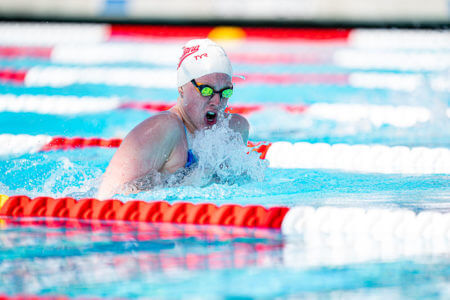
Lilly King at the 2021 TYR Pro Swim Series in Mission Viejo — Photo Courtesy: Becca Wyant
As for the competitiveness, the “Killer Lilly” persona seen so often on TV, that’s also very much genuine. King has a younger brother, Alex, who recently completed his own college swimming career at Michigan. Less than a year apart in age, Lilly called Alex “my best friend and my worst enemy,” and she added that the two are alike in almost every way, except that she is typically optimistic and Alex typically pessimistic. And growing up, the two constantly competed with each other in everything.
“Everything we did when we were little was a race. Everything was a competition. Whether that was piano lessons or cleaning our room or literally anything was fair game for competition. Except for running up the stairs.”
King sought competition from a young age, so much so that she avoided any game with no possibility of winning and losing. The sibling rivalry between the two helped instill the characteristic that has propelled King in her swimming career: the sheer hatred of losing.
Lilly King Since Rio
All her life, the message to herself has been “win, win, win,” be it against Efimova or her brother or anyone else. These days, King just does not lose, at least in her specialty event. She has not been beaten in the 100 breast (long course) since she won gold at the Rio Olympics, and her last loss came at the 2015 U.S. Nationals, when the then-18-year-old finished second to future Olympic teammate Katie Meili. King has admitted that she likes the feeling and the pressure of being the underdog, and in those situations, she consistently thrives.
In 2017, Efimova threw down a huge challenge to King at the World Championships by almost breaking the world record in the semifinals (missing by just one hundredth), putting the pressure on King for the final. But she responded in striking fashion, dominating the heat and taking down the world record with a 1:04.13. King would add a second world record in the 50 breast (29.40) a few days later. No one has considered her an underdog in any sprint breaststroke race since.
“I’m going to say I’m the best,” King said. “I haven’t lost a 100 breaststroke (LC) in five years. I don’t think I need to defend myself on that one.”
However, her career path in the 200 breaststroke has been much less dominant. Days after winning Olympic gold in the 100 breast in Rio, King went all out from the start in her 200 breast semifinal, but ended up fading to 12th. By 2017, she had made a big jump in the longer event, finishing fourth at the World Championships in 2:22.11, missing a medal by less than 2-tenths.
In 2019, she swam as fast as 2:21.39 at the FINA Champions Series in Indianapolis, beating out Efimova, who would win her second straight world title in the event soon after. But King found herself unable to challenge her Russian rival at those World Championships, a circumstance brought on, King believes, because she again chose to voice her strong opinions.
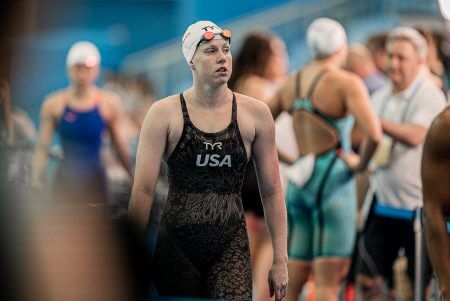
Lilly King at the 2019 FINA World Championships — Photo Courtesy: Becca Wyant
“This is my personal theory, completely and totally a conspiracy theory. I said FINA was corrupt the day before the meeting started because they let Sun Yang swim,” King said, referring to the Chinese distance swimmer allowed to compete at those World Championships despite a pending hearing for a doping violation. “And they said, ‘All right. You did an illegal turn in the 200 breaststroke in prelims.’ I think that’s what happened. I’m pretty confident that’s what happened.”
King was disqualified for a one-hand touch in prelims, and an appeals committee sustained the DQ shortly before the semifinals. That day, King admitted that she had committed a violation on her turn, but almost two years later, she said, “I’m sure I came out and said I did it so I wouldn’t get in trouble anymore.” She remains convinced that no one could have detected the illegal turn with just their naked eye and no frame-by-frame video replay.
So now, approaching the postponed 2021 Olympics, King remains the undisputed queen of the 100 breast and a complete wild card in the 200 breast. Her coach at Indiana, Ray Looze, called King’s 200 breast “still a bit of a work-in-progress.” She excelled in the short course meters version of the event during the 2020 International Swimming League season, and she trains at Indiana with Annie Lazor, the ninth-fastest performer in history in the 200 breast, but she has not had a chance to show her abilities in the long course event in years. On her strategy for the 200 breast for the Olympic year, King said, “I’ll probably decide behind the blocks.”
Looking to the Future
King comes from a family of teachers, including her mother, father and grandmother, and in college, King majored in physical education. She student-taught third through eighth grade in the spring of 2019, and “Goofball Lilly” had a blast. “I feel like it’s easy to connect with the kids,” she said. “Talk to kids and get them going on silly conversations and just having fun with them—it’s just a fun group to work with.”
But any teaching, she insists, will be a long way down the road. When she does stop swimming, she wants to use her platform as one of the world’s best, although she doesn’t yet know how. She has no immediate plans to be done swimming anytime soon, either.
“For so long, I thought I (would be) done after 2024. I really feel like the quarantine and having everything taken away from me so quickly gave me a greater appreciation for what I’m doing and just kind of sparked that joy again,” King said. “I’m going to keep going until I’m not having fun anymore, and when I start saying I’m going to work and I’m not going to practice, that’s probably time to stop.”
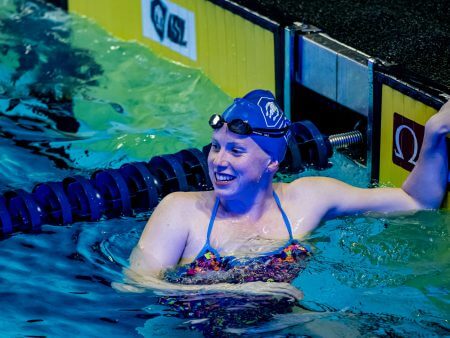
Lilly King warming up during the 2019 ISL season — Photo Courtesy: Peter H. Bick
When the COVID-19 pandemic began in March 2020 and the Olympics were postponed, King was fairly stoic. “I’m a serial under-reactor,” she said. Even as some of her teammates, including Miller and Lazor, became upset with the decision to postpone the Olympics, King calculated in her head that the postponement should not significantly impact her Olympic prospects, and that under-reaction became her coping mechanism. “That’s just kind of how I handle things,” she said. “In situations where I’m literally shocked, I’m like, ‘I feel nothing.’”
As for any lingering uncertainty about whether the postponed Olympics will in fact take place this year, King isn’t concerned. She won’t let herself worry, just like she won’t consider the possibility of losing a race.
“I never think of what’s going to go wrong in my racing. Never. I only think of the best possible scenario. When I visualize my races, I never think of what can go wrong. I only think of the race I want to swim. For this summer, I’m trying not to think of what could go wrong, and only think of the best-case scenario.”



